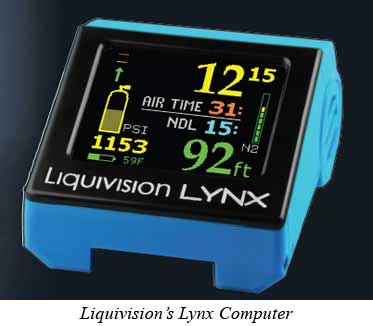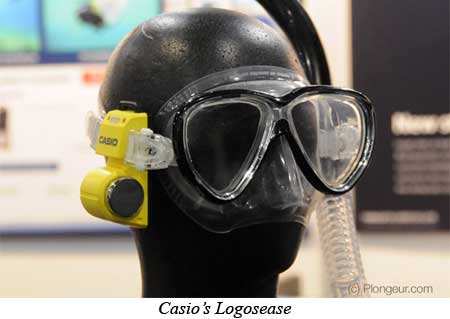What’s the “One DEMA” Product This Year?Contents of this Issue: Sipadan Water Village, Borneo, Malaysia Bandito Charters, Tacoma, Washington How About Recycling Your Old Dive Gear? Bonaire, Cozumel, St. Vincent… Death in Belize from Exploding Tanks What Dive Shops Think About Your Gear The Dangerous Risk of Boats Without Dive Ladders Mastering Rebreathers, 2nd Edition What’s the “One DEMA” Product This Year? Maiden Dive Boat Trips: Another Liveaboard Owner’s Point of View Editorial Office: Ben Davison Publisher and Editor Undercurrent 3020 Bridgeway, Suite 102 Sausalito, CA 94965 John Bantin reports on what’s worth buying and ignoring from the January, 2013 issue of Undercurrent
Away from the oppressive hustle and bustle of the casinos, the roar of the massed one-armed bandits and the distraction of scantily-clad women, the Sands Expo and Convention Center in Las Vegas was the place where the world's diving trade met in November to chew the fat and show what they had to offer. The world's premier diving destinations had booths positioned cheek by jowl with all the equipment manufacturers, not only the long-established companies but also those hoping to break into the market with what they perceived to be the underwater equivalent of the best thing since sliced bread. It's often the "One DEMA" product that provides the most entertainment for those seeking out the newest equipment. These are the products displayed hopefully by those who have come up with an engineered solution to a problem that probably doesn't exist and will have sunk without a trace within 12 months. But this year, several of those apparently no-hope products were back again in a more developed form. For example, there was the automatic buoyancy control device that was shown about 15 years ago. It worked -- but truth is, it just wasn't needed. Most divers can manage the manual direct-feed and dump valve on their BC. Not to be discouraged, a Swiss manufacturer has picked up the lapsed patent and added a decompression computer. The SUBA series will be available pre-fitted to BCs. We'll see whether it was ahead of its time 15 years ago ... or whether there will never be a time. Another company displayed Diver Guide, a device that monitors a diver's breathing. Fitted in place of the BC direct-feed control, it will sound a siren if it detects inactivity for more than 30 seconds. If that doesn't startle the diver back into life, it automatically fills the BC with air and sends the presumed-bynow- fatality back to the surface. You can be sure there will be no rush to purchase this by underwater photographers, who habitually hold their breath to get that all-important shot.
Innovasub showed a housing complete with a pressure sensor that employs an app to turn the iPhone, iPod, smartphone or PDA into a capable diving computer with external module and a wide range of different algorithm options. It's predictably called the Divephone. Casio, the Japanese watch giant, came to DEMA with Logosease, a diver communication system mounted on the mask that is activated orally and received aurally though the jawbone. Its software promises to unravel the garbled speech of a diver with a regulator in the mouth while the actual communication sent diver-to-diver is by ultrasonics. Unfortunately, there was no way to verify its workability at the show. Oceanic's Jetpack is a backpack-style unit that can easily be used as an aircraft carry-on but also forms a BCD, allowing the user to carry all basic diving equipment on his person. Oceanic also showed the Aeris Manta, a wristwatch with a built-in dual algorithm computer in six different colors and the Oscar, a continuation of its OC computer range that comes with a wireless integrated gas system and the F10 free-diving computer. It also reintroduced its once popular side-exhaust regulator with the Manta 3 together with the similar Hollis 500SE, which has useful extra configuration details for technical divers. Atomic Aquatics showed its remarkable new super-lightweight titanium T3, which has been developed from the famously good T2x by, for example, paring away superfluous material from its first stage. Other face-lifted regulators included Scubapro's G and R ranges, with the S range now available in a range of different metals and finishes, including a gold-look model. These sat alongside an interesting display of nearly all regulators Scubapro ever made. This brought a tear to the eye of some older attendees reminiscing over long-loved yet forgotten equipment. Beuchat has face-lifted its VX10 Iceberg, and Mares has made some needed internal improvements to its novel Instinct model, including a novel shaped heat sink added to a first stage. TUSA also had an entirely new regulator on display, as did Sherwood with its SR-2, the replacement to the successful, if flawed, SR-1. There were no really revolutionary new fins, but Aqua Lung showed its X-Shot fins, which are like the Hot Shot and Sling Shot fins but with their silicone tensioning-springs hidden within their form.
While BC improvements were aimed at the needs of women, most BCs and wings were simply evolutions from previous models. Many manufacturers showed new masks, usually with improved silicone skirt technology such as that used by Scubapro, with its flexible skirt ribbed for both resistance to collapse and comfort. Seac showed the 360 snorkel, with a revolutionary 360-degree valve mechanism that allows the snorkel to drain yet keeps the water out when used at any angle. There were plenty of sexy neoprene wetsuits visible all around the giant Expo hall, but of course, few of us have bodies that match the shape of the mannequins on which they were displayed. Apollo, the Japanese manufacturer, showed a drysuit with manual dump valves positioned at shoulder, cuff and ankle. That should take care of inversion problems! Fourth Element showed its new drysuit, augmented with colourful Lycra rash vests for use in warmer conditions. A different novelty offering was the Scuba Buddy, a scuba trolley system suitable for shore divers, which converts easily to be taken on a dive as part of one's underwater gear. An enterprising Norwegian came to show off SubWing, a steerable wing that can be used on a speedboat to tow a snorkeler below the surface for either search-and-rescue missions or simply having fun. With more and more video being shot on cameras like the Canon 5D and Nikon D800, Dive and See showed an off-board monitor suitable for those shooting video, with high-end DSLRs alongside a stand-alone submersible recorder unit. Very promising was Vivid-Pix, a simple software solution for easily improving the color rendition of pictures taken underwater by the majority of us who simply record JPEGs on our compact cameras. There has been some evolution in underwater lighting, notably with new products from Light & Motion that are brighter and with more duration than before, including the Sola Tech 600 and the Sola Video 2000. After many years, it seems that flouro photography has at last caught the imagination with ultraviolet-emitting versions of these lamps. A larger 4000 lumen lamp was on display. Keldan, the Swiss manufacturer of top-quality and, thus, phenomenally expensive underwater lighting, is concentrating on the professional end with an impressive 7000 lumen lamp, also available as a 'high CRI' 5300 lumen version for the most vibrant and accurate color underwater. I-Torch showed a range of diver's lights with batteries that would survive flooding, alongside the iPix smartphone camera housing. Ikelite also had the Vega, a new 2000 lumen lamp, plus the Manta, a new and welcome addition to its range of underwater flashguns. Fantasea has made a major change with its camera housings in that its total allegiance to Nikon products has been broken -- it now offers housings for some popular compact Canon models, too. It also had a mini set-up with lights that made use of the GoPro camera, plus a range of other LED lights, including the BlueRay Extreme video light. Epoch showed the Mini-DV, an amphibious camera complete with lamp that rivalled the GoPro for its small dimensions and competitive price. SeaShell continues to offer a plastic housing that can be adapted for a wide range of compact models, and this range has been extended as the possibilities increase. It also revealed its housing for iPhones to use them as underwater cameras. Lastly, for those divers who already have everything, GreenForce, the Antwerp-based company well known for its powerful lamps and Hugyfot camera housings, offered a lamp head studded around its rim with diamonds. It costs many tens of thousands of dollars, of course, just what you need to leave to dry on your porch on Bonaire while you take a nap. John Bantin, a longtime contributor to Undercurrent, is the technical editor of DIVER magazine in the United Kingdom. For 30 years, he has reviewed virtually every piece of equipment available in the U.K. and the U.S., and makes around 300 dives per year for that purpose. He is also a professional underwater photographer. |

I want to get all the stories! Tell me how I can become an Undercurrent Online Member and get online access to all the articles of Undercurrent as well as thousands of first hand reports on dive operations world-wide
| Home | Online Members Area | My Account |
Login
|
Join
|
| Travel Index |
Dive Resort & Liveaboard Reviews
|
Featured Reports
|
Recent
Issues
|
Back Issues
|
|
Dive Gear
Index
|
Health/Safety Index
|
Environment & Misc.
Index
|
Seasonal Planner
|
Blogs
|
Free Articles
|
Book Picks
|
News
|
|
Special Offers
|
RSS
|
FAQ
|
About Us
|
Contact Us
|
Links
|
3020 Bridgeway, Ste 102, Sausalito, Ca 94965
All rights reserved.

 Some years ago, I reported on an Israeli company that brought us underwater texting. It has exhibited
its UTC computer -- which can also text -- at DEMA every year since, but has been reticent at letting
us members of the press have units to try. Now it has competition from Liquivision, the manufacturer
of those technical diving computers with the OLED display and the tap-switch system. It introduced
the Lynx, a new computer that can not only be wirelessly gas-integrated with up to ten tanks, but can
receive texts from a boat unit more than a kilometer away -- handy for diver recall whether it be an
emergency or simply a call for lunch.
Some years ago, I reported on an Israeli company that brought us underwater texting. It has exhibited
its UTC computer -- which can also text -- at DEMA every year since, but has been reticent at letting
us members of the press have units to try. Now it has competition from Liquivision, the manufacturer
of those technical diving computers with the OLED display and the tap-switch system. It introduced
the Lynx, a new computer that can not only be wirelessly gas-integrated with up to ten tanks, but can
receive texts from a boat unit more than a kilometer away -- handy for diver recall whether it be an
emergency or simply a call for lunch. Meeting the demand for those divers who now want to side-mount their tanks for openwater diving
as opposed to cave diving, several companies demonstrated side-mount rigs with corrugated hoses that
could be swapped to feed from the top, instead of the bottom, of the
buoyancy cell, and allow for more vertical ascents. These included
Custom Divers, DiveRite and Hollis.
Meeting the demand for those divers who now want to side-mount their tanks for openwater diving
as opposed to cave diving, several companies demonstrated side-mount rigs with corrugated hoses that
could be swapped to feed from the top, instead of the bottom, of the
buoyancy cell, and allow for more vertical ascents. These included
Custom Divers, DiveRite and Hollis.